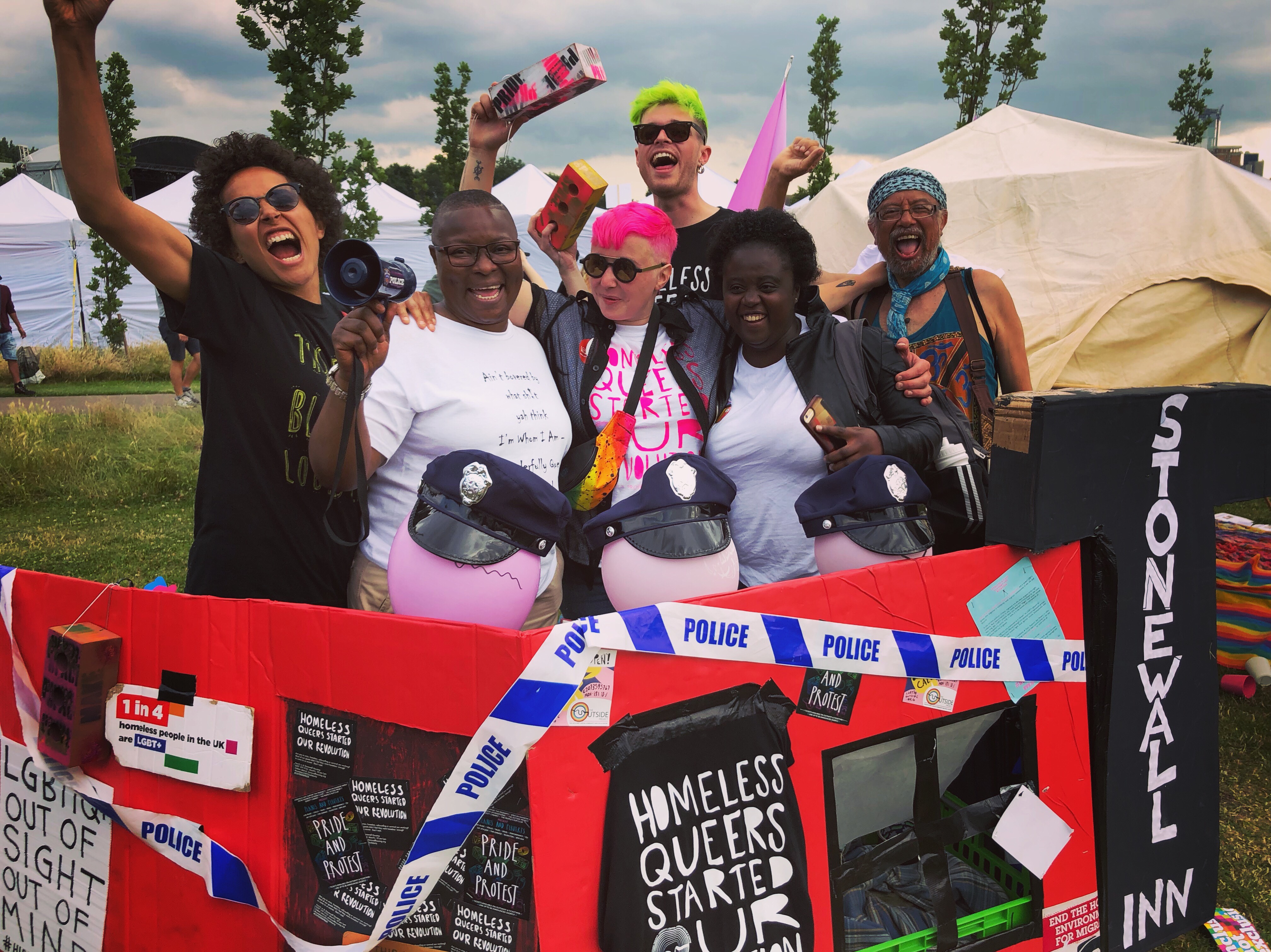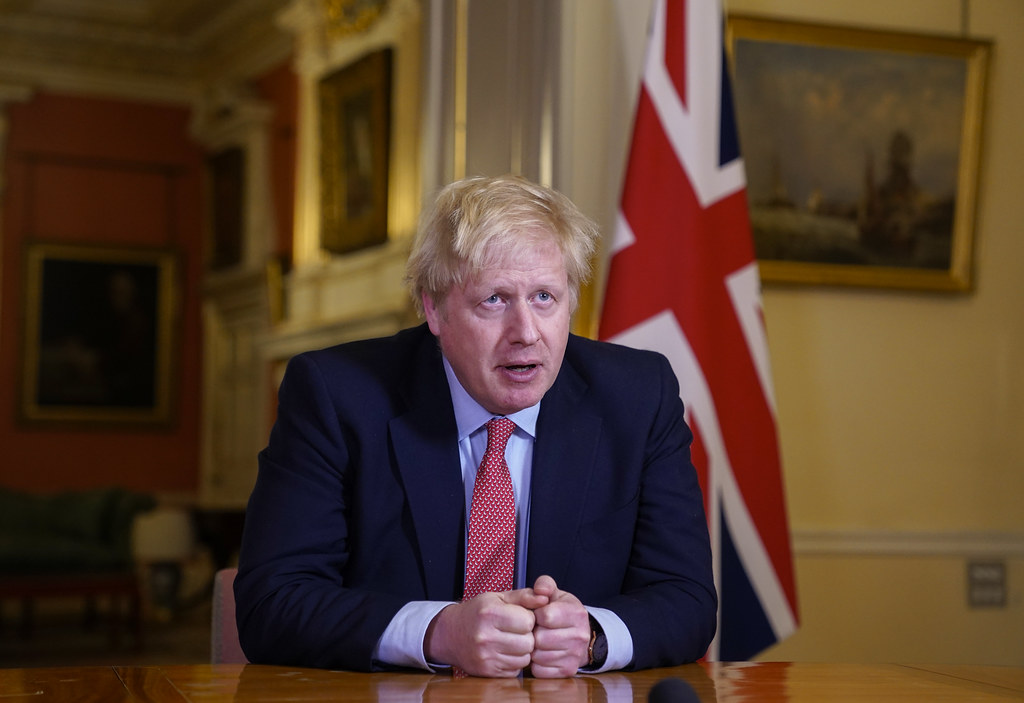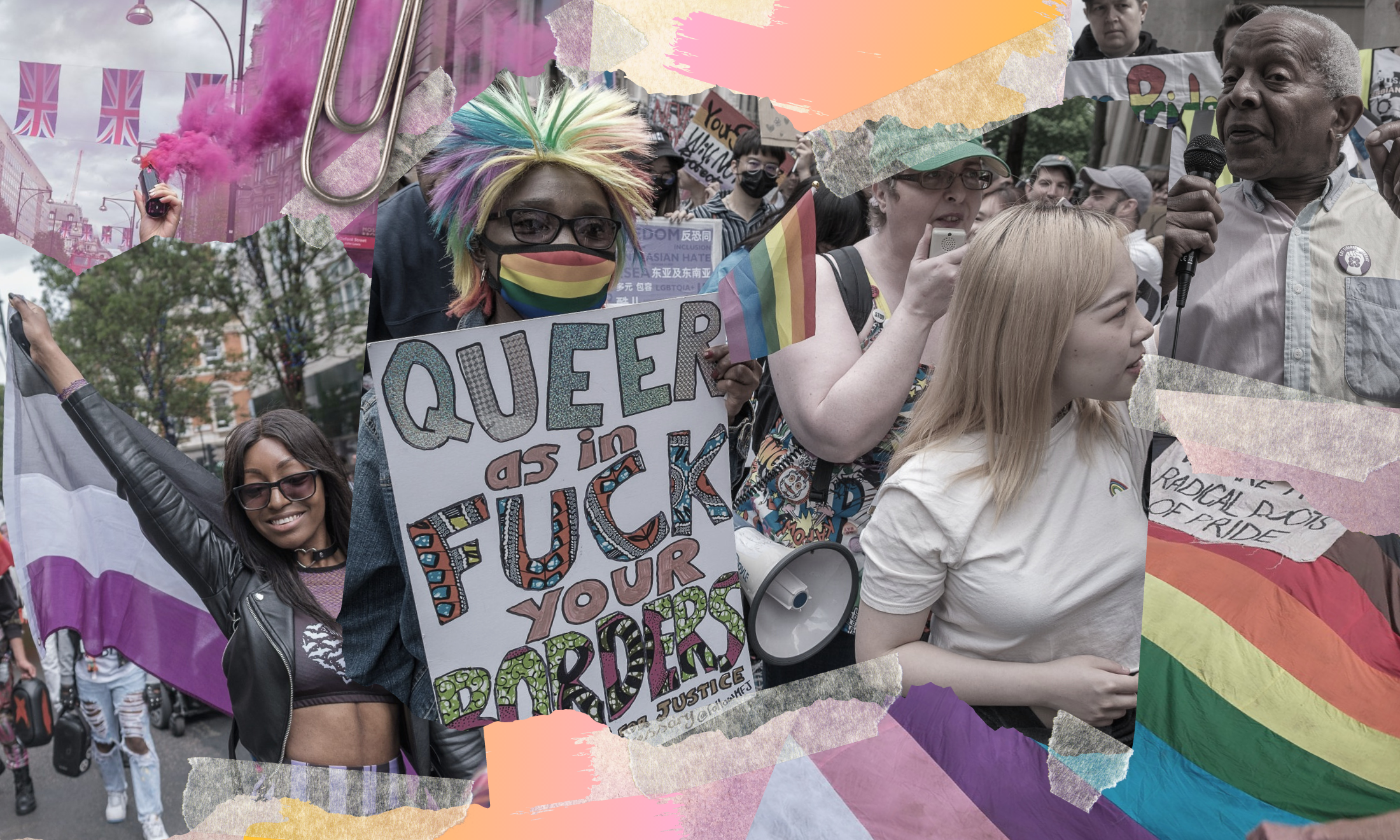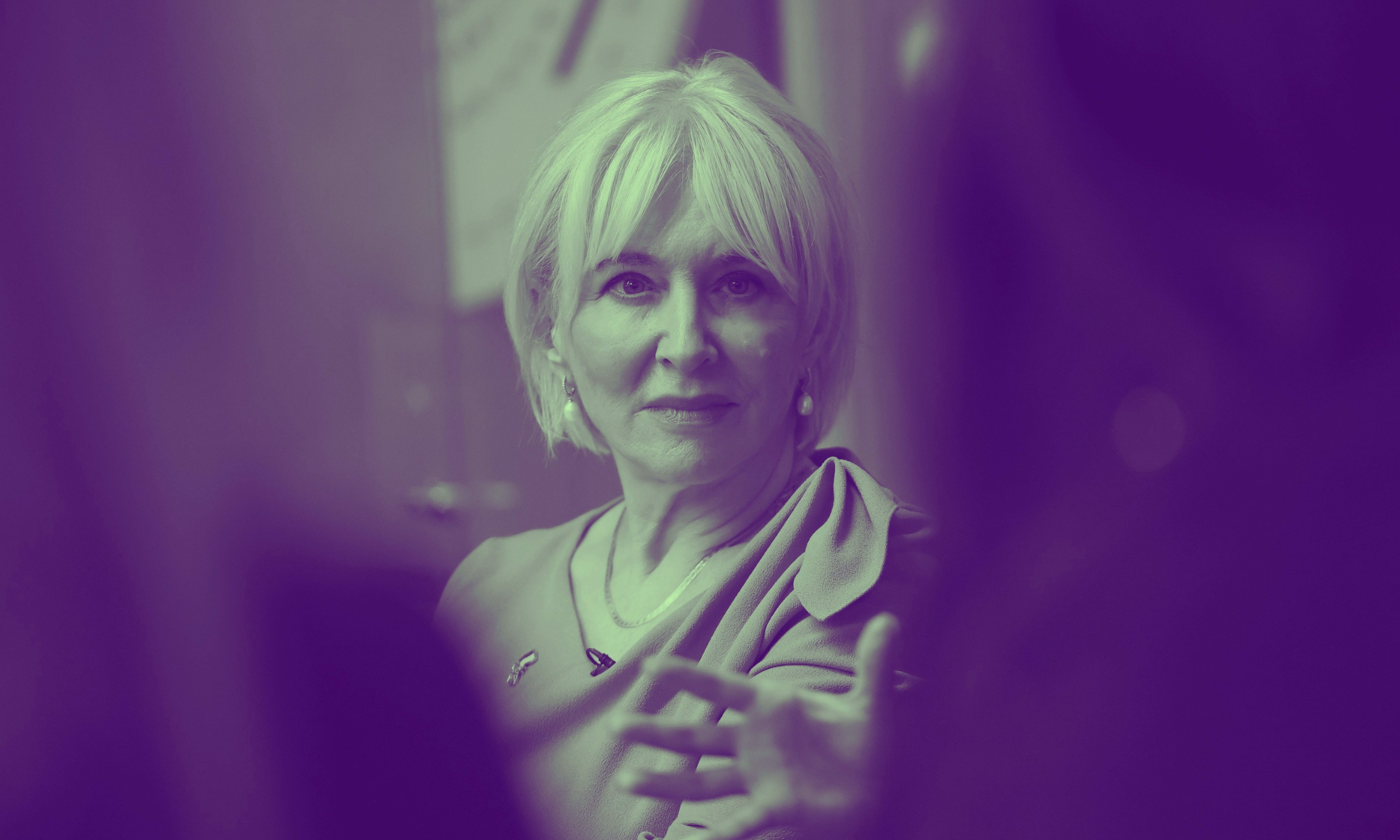
Image courtesy of The Outside Project
On a grey morning a few months ago, I sat down with guests and staff at The Outside Project, the UK’s first LGBTQI+ homeless shelter and community centre. The new shelter, based in the former Clerkenwell fire station which was shut down in 2014 by Boris Johnson as part of Fire Services cuts, houses 10 people across two shared and two private rooms. The living area we sit in isso cosy that it is easy to forget that we are in a former garage. We discuss the project: a victory for grassroots and community led action.
Carla Ecola, one of the co-founders, tells me that the project – the first of its kind in the UK – was launched in 2017 by LGBTQI+ activists who work in the homeless sector, and who have lived experience of homelessness. As well as the issue of gaps in provision for marginalised groups within the homeless sector, Carla explains the frequent lack of comfort felt accessing services through fear of LGBTIQ-phobia. “They didn’t feel safe talking about who they were” Carla tells me, “so they weren’t being open about their experiences of hate crime, domestic or sexual abuse that could entitle them to emergency support.”
The Outside Project previously piloted their service in a 12-bed tour bus, parked in the secure grounds of a community centre which guests could access for evening meals, toilets and showers. Covered in flags and art, Carla recounts how the smaller space of the bus allowed people to bond and really get to know the crew of volunteers. In that sense, a real community was created with “lots of games of Uno and film nights, [and] an endless supply of treats”. Guests described the bus to the volunteers as “a bubble of safe space”.
“Kiki* recounts her experience of being repeatedly misgendered by Camden Council and the Job Centre”
Kiki*, a guest of the new shelter, explains how the lack of staff training on the specific issues facing the LGBTQI+ community within homelessness outreach services is isolating. Narrow and stereotypical ideas of what LGBTQI+ people should look like leads organisations to wrongly believe that they aren’t accessing services. Kiki recounts her experience of being repeatedly misgendered by Camden Council and the Job Centre, and despite being a young trans woman of colour, not being categorised as a vulnerable rough sleeper eligible for priority shelter.
Trans women are especially at risk of violence both on the streets and in shelters, often having to change their appearance and presentation for safety. Examples of being urinated on, having drinks spiked, and facing homophobic sexual violence reveals how the experience of homelessness for LGBTQI+ people can be humiliating and life threatening.
Kiki’s experiences are alarming, but not unique. For LGBTQI+ immigrants and people of colour, Theresa May’s “hostile environment” immigration policies intensify the risk of immigration enforcement action being taken against people, in particular when accessing public services. Enforcement of the archaic Vagrancy Act 1824, which criminalises rough sleepers and beggars, and the recent rise in use of Public Safety Protection Orders (PSPOs) which allows police to criminalise non-criminal behaviour over a geographically defined area marks increasingly aggressive state surveillance of rough sleepers which disproportionally affects people of colour.
Furthermore, last year it was exposed that homeless charities had been complicit in performing joint operations which target migrant rough sleepers. St. Mungo’s, one of the country’s largest providers of homeless outreach admitted to the Guardian that it cooperated with immigration, compliance and enforcement officers searching for undocumented migrants with a view to detaining and deporting them. Recent campaigning by homeless charity Streets Kitchen has resulted in Islington Council pledging not to pass rough sleeper information to the Home Office, calling on other local authorities to follow suit.
The hostile environment includes a whole raft of policies and processes which make migrant communities’ lives difficult, and in some cases utterly untenable in the UK. The ‘Right to Rent’ scheme, for example, which legally obligates landlords to check the immigration status of tenants and lodgers, was declared incompatible with human rights law in a ruling handed down at the high court earlier this year. Research by the Home Office itself has shown that 25% of landlords would now not rent to people without a British passport. A report published in 2016 concluded that “four decades of struggle by black and minority ethnic communities, bolstered by legislation, statutory and regulatory codes from the 1960s onwards, have failed to confront adequately and systematically racial disadvantage and discrimination in housing”. The result of this discrimination is a system of welfare that disproportionately does more harm than good to vulnerable LGBTQI+ people of colour.
“Research produced by Stonewall and YouGov state that one in four homeless identify as LGBTQI+”
There is no central database for statistics on homelessness, and numbers of homeless people in the UK can vary from 24,000 to 320,000. Research produced by Stonewall and YouGov state that one in four homeless people identify as LGBTQI+ and that 25% of people identifying as transgender have experienced homelessness at some point in their lives. This does not take into account the innumerable “hidden homeless” who may find temporary solutions by staying with family or friends, remaining in abusive relationships, or engaging in survival sex. “The current austerity climate, a period of intensive public funding cuts, has hit people of colour the hardest” explains a Policy Coordinator from Imkaan, a charity which addresses gendered violence. “This means that when people are experiencing forms of abuse such as domestic violence and so-called ‘honour-based’ violence, they might have less financial security and less options about where to go if they flee a violent situation”.
A service organised and run by the people it aims to assist, such as The Outside Project, inevitably has greater knowledge of what is needed, and can act accordingly. The shelter’s large communal area provides space for different groups – such as Lesbians and Gays Support the Migrants, who working to oppose the deportation of LGBTQI+ asylum seekers by the Home Office, and Queerdome – to organise. A community centre housed in the project is also being run with several other LGBTQI+ organisations such as Queerseum and African Rainbow Family. The centre hosts cultural and artistic events alongside providing housing advice and employment support from Stonewall Housing. Creating an alternative to the often cramped and busy spaces available to homeless people was important to Carla when considering that 12% of LGBTQI+ people are autistic, meaning they may have access needs around sensory issues and crowded places. There is also room for guests themselves to found and run their own groups, such as Kiki, who now holds a weekly women’s group.
“The non-profit sector in the UK is a £45.5 billion industry, however public funding cuts have slashed council funding for local shelters”
Organisations like The Outside Project, which is founded and driven by the people from the community it aims to serve, radically differ from non-profit and charitable institution norms. Research from 2015 revealed that the non-profit sector in the UK is a £45.5 billion industry, however public funding cuts have slashed council funding of local shelters. In April 2019 it was reported that services for single homeless people such as Homeless Link have lost £590m on average per year in the last decade. In some cases, those who are wealthy enough to set up foundations have no incentive to dismantle the system that has kept them rich. This can be characterised as a “non-profit industrial complex”, described in this zine as “a system of relationships between the state […] foundations, and non-profit/NGO social service & social justice organisations”. The zine goes on to outline that within this complex, the state uses large mainstream non-profits to “monitor and control social movements” and “redirect activist energies into career-based modes of organising instead of mass-based organising capable of actually transforming society”.
In contrast, The Outside Project is being run on a limited budget: the Mayor of London’s Rough Sleeping Innovation Fund supports one Outside Project employee and one Stonewall Housing employee, including funding the project’s core costs and the building they are using (which they are permitted to use by the permission of London Fire Brigade). Carla stresses that “without this support we would still be on the back of a bus, but without the community, that bus wouldn’t have existed at all”. The Outside Project has been made possible by the crowdfunding efforts of the LGBTQI+ community, with people offering creative skills, club night collections, and donations from weddings and birthdays, including one funeral. “So many LGBTIQ+ people who have been in a situation of being homeless or nearly homeless, or have a friend who has, and just get how much it is needed”, Carla explains.
In the context of a government committed to funding cuts which hit marginalised people the hardest, and an incoming prime minister who doesn’t look set to buck this trend, The Outside Project’s impact goes far beyond the guests who access it. Carla spoke of the importance of “queering up” existing spaces for vulnerable people, essentially making mainstream services aware that LGBTQI+ homeless people exist and face specific problems and injustices. Whilst sanctuaries have always been run by and for homeless queer people, the official backing of Mayor of London will help to sustain and grow the Outside Project, providing year-round shelter and empowerment to marginalised people who are in most need of a transformative space for healing and support.
*name changed
Kiki’s women’s group is held on Thursdays between 6-9 at Clerkenwell Fire Station. You can find more information about The Outside Project here: http://lgbtiqoutside.org/ and support their work here: https://www.goldengiving.com/wall/the-outside-project









